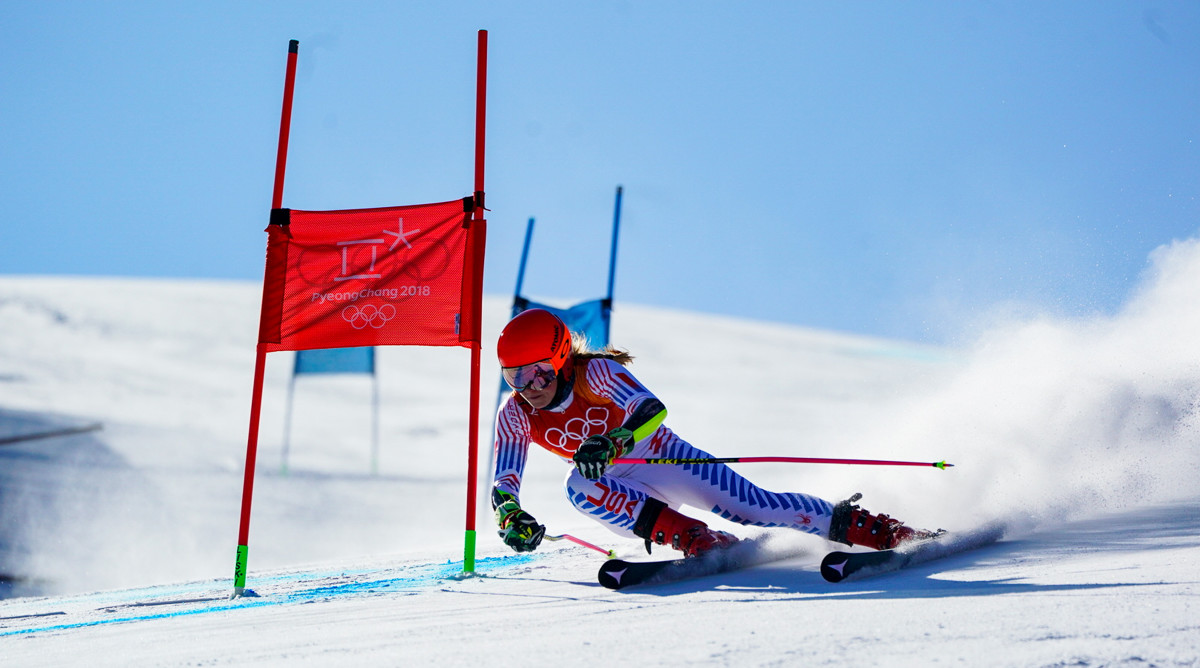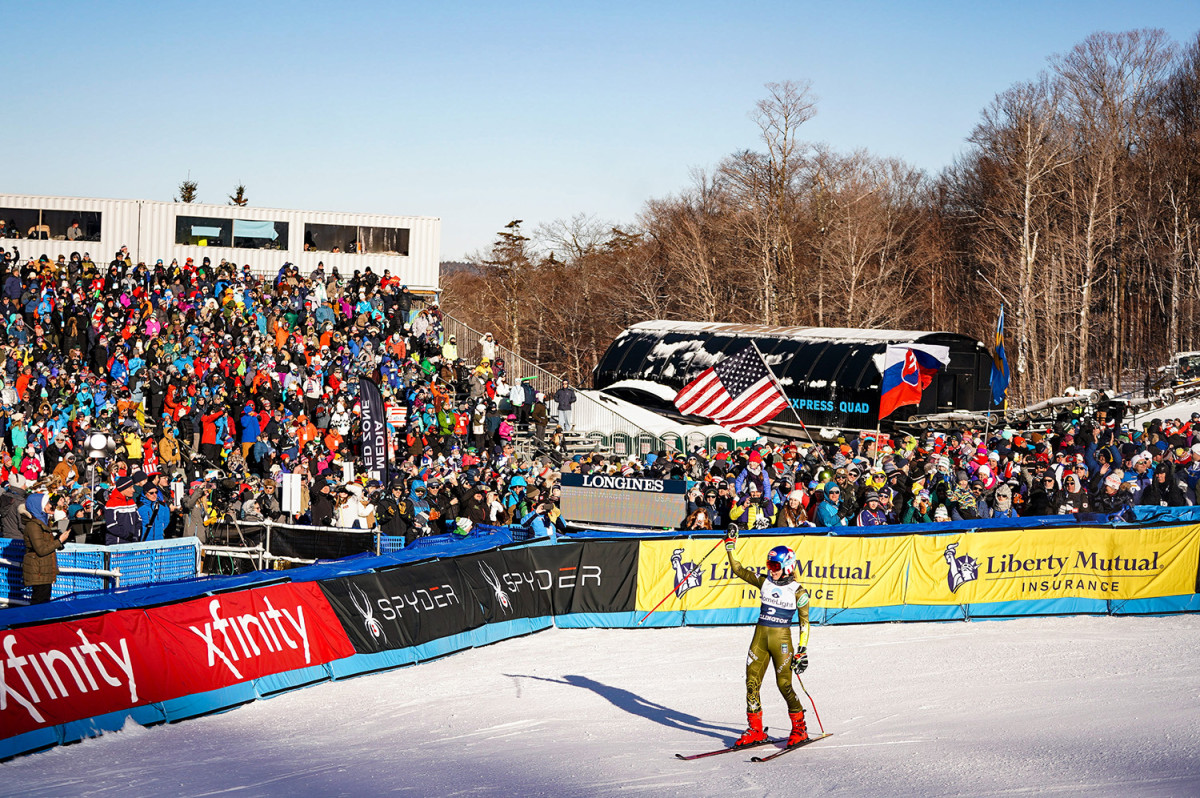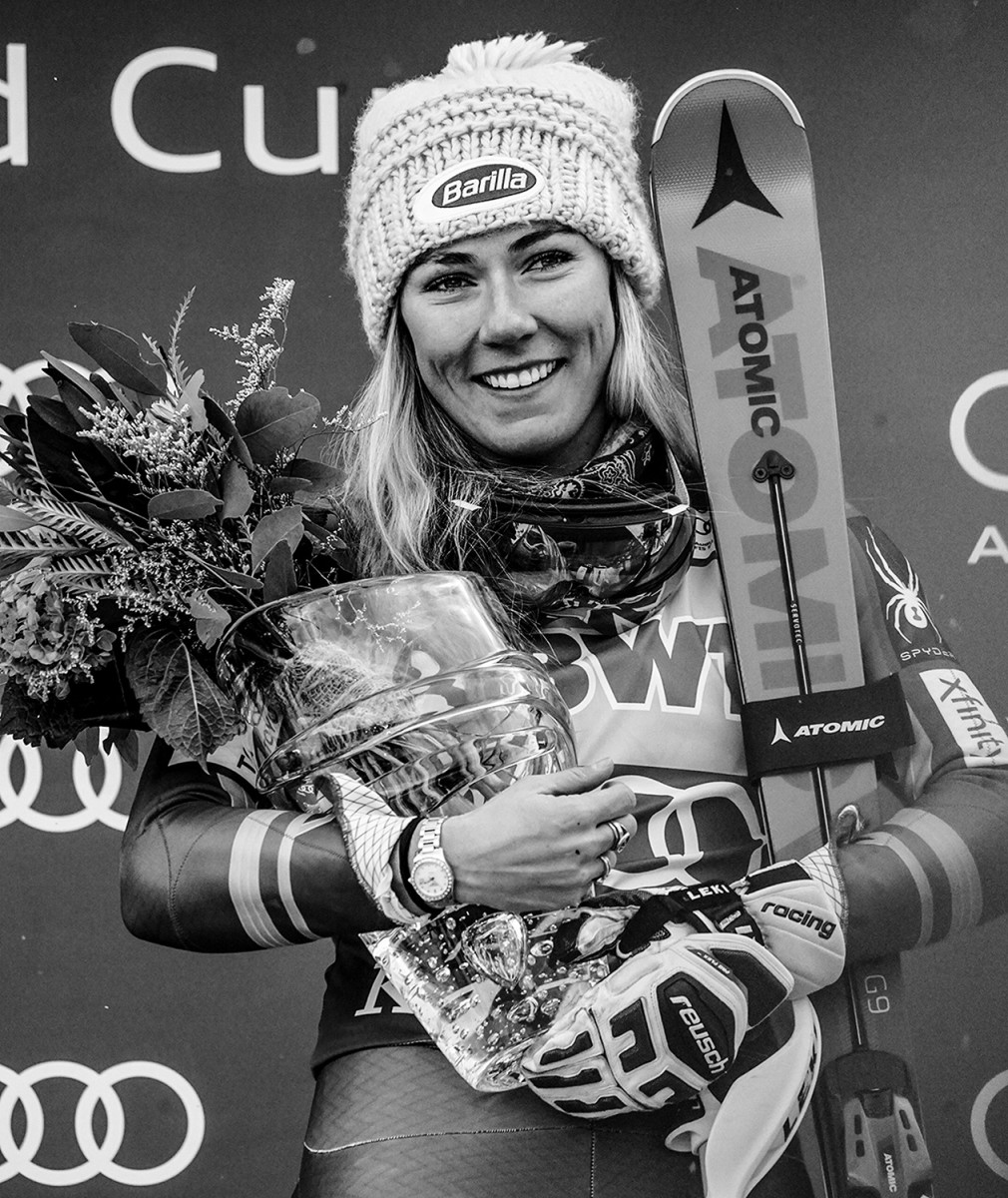After Historic 2019, Mikaela Shiffrin Is Slowly Embracing Her Greatness


The first thing everyone should know about Mikaela Shiffrin is just how dominant she is. One could argue—quite reasonably—that she is the single most dominant athlete on the planet right now. Sports Illustrated followed her for an afternoon on the cusp of a new season, as she hopscotched between hotel rooms at Copper Mountain resort, where she was confronted with her utter dominance again and again. Settling onto stools in front of green screens and white screens and screens with crowds painted as the backdrop, she listened to interviewer after interviewer repeat the same facts. They mentioned her record-breaking 17 World Cup victories last season, three more than Vreni Schneider won in 1988–89. They pointed to the fact that Shiffrin became the first skier to win World Cup titles in slalom, giant slalom, Super-G and overall in the same year. They noted how she was the first to earn $1 million in prize money in a single season. And then they always landed at the same place: that Shiffrin turned just 24 in March.
She tries to deflect the immensity of her accomplishments, even while experts, like the most prolific American male skier, Bode Miller, made the case that what she accomplished last season is without precedent in all of sports. Better than Novak Djokovic's 2015 season, when he won three Grand Slam tournaments, or even the so-called Tiger Slam of '00–01. "Those are sports where you can make errors in matches and just recover," he says. "In our sport, the margins are so fine, the tolerance for errors is so small, it's just that much more difficult to win as many races as she did."
With her most recent World Cup win, a slalom victory in Killington, Vt., on Dec. 1, Shiffrin earned career title No. 62. The victory inched her closer to the all-time record of 86, held by Ingemar Stenmark. Among active skiers today, American Ted Ligety ranks second in career wins, with 25.

The second thing everyone should know about Mikaela Shiffrin is she would rather discuss anything other than her dominance. That’s evident when an interviewer proposes a series of rapid-fire questions designed to reveal her personality. Shiffrin would rather answer those. “She’s not a go-for-the-jugular person,” says her mom, Eileen. “It’s just not her personality. She’s calculated, and sometimes people use that in a derogatory way. I see it as a compliment. She’s not stupid or careless.”
Shiffrin describes her personality as "weird."
Her most commonly used emoji: the little guy with the jazz hands. Her spirit animal: a sloth. Her most unusual race prize: a reindeer, who she named Ingemar. Her career expectations in childhood: “Actually, I wanted to grow up to be a flying rainbow horse.”
All of which is to say that Mikaela Shiffrin, an athlete known to serenade or play guitar for her 862,000 Instagram followers, a skier who rides unicycles and juggles soccer balls for fun, traffics in a rare combination of dominance and awkwardness. On one hand, she’s glad that strangers don’t often stop her out in public away from races. On the other, she knows she’s partly responsible for the popularity of an entire sport.
Born in Vail, a ski mecca, to ski parents, Jeff and Eileen, Shiffrin first learned the sport on plastic skis in her driveway—at age 2. Growing up, she obsessively studied videos of history’s best skiers. Eventually, her mom became her coach and the family moved to Vermont, so she could train at Burke Mountain Academy full time. Tiger Shaw, president of the U.S. Ski and Snowboard Association, used to tell anyone who would listen that the child prodigy would win World Cup races one day. “That’s not because I’m brilliant,” he says. “It was because she was so obvious.”
And yet, Shiffrin has remained unassuming, at once entrenched in excellence and yet not entirely certain that she belongs in the pantheon of the best athletes in the world. She once met Seahawks quarterback Russell Wilson and his wife, the pop star Ciara, an experience she describes as “surreal.” At last summer's ESPYs, she sat near soccer stars Megan Rapinoe and Alex Morgan and WNBA MVP Breanna Stewart. "It's a little weird because it's hard to imagine having a place there," Shiffrin says.
She's not joking. Nor is she naive. Shiffrin identifies naturally as an introvert, and that very shyness has forced her to grapple with her greatness. She knows that her races took place on different continents last year, with international travel every week; that she raced against specialists in every discipline and beat them all; that she competed in varied snow conditions, weathering through wind, rain, hail and flat light. She knows that to win 17 times under that dramatically changing landscape was evidence of greatness. But Djokovic greatness? Rapinoe greatness? "I struggle with that," she says.
Another thing everyone should know about Mikaela Shiffrin is the advice she received from Roger Federer at a sponsor event a few years back. When she asked him what he would have done differently in his career, Federer answered that he would have reveled in his accomplishments a little more. Dominant runs might feel like they’ll last forever, but, he told her, “they’re fleeting, and you never know what’s going to happen.”
She tried to keep that in mind last season. To accept her place in history. To allow for a celebratory dinner. To embrace not the trophies but how she came to collect them. “It’s strange, I know,” Shiffrin say. “Because the point of ski racing is to win.”
Shiffrin can’t think that way, though; if she does, she’ll lose. That’s happened before, and it might happen again. Every person wants to win, she says. That thought alone won’t separate her. Take the 2018 Olympics, for example. Shiffrin floated the idea leading into PyeongChang that she might win five gold medals. A dreadful combination of nerves and delays brought on by bad weather doomed that pursuit. She still won a gold (her second overall) and a silver, but the way her Olympic hopes had been framed at the outset made that haul sound like a failure, when she considered it a triumph. “There are so many variables in the sport that are out of your control that the fact that somehow things worked out for 17 races last season is surreal,” she says. “Which is weird to say, because I’d never expect to, like, win 17 races. I didn’t expect it last year, and I would never expect to do that again. But knowing what went into it, it’s also not that farfetched.”
Anyway, Shiffrin doesn't even consider herself the greatest skier of all time. That honor, she says, still belongs to Lindsey Vonn, the subject of book reports written by a young Shiffrin. But the fact is that Shiffrin has won earlier, more often and with fewer injuries. "I believe Lindsey is the greatest female racer of all time as it stands right now," Miller says. "And I still would call Mikaela better than Lindsey in basically every aspect."

That is not to say Shiffrin's good fortune and great success will continue unabated. Vonn is proof of that, too. She won an incredible 82 races, bolstering her argument as the greatest female ski racer ever, and yet injuries limited her in later years and changed the narrative surrounding her accomplishments. Unfairly, Shiffrin says, arguing that the number and severity of the injuries Vonn came back from only adds to her greatness.
To that end and to the unending chagrin of particular event organizers, Shiffrin skipped more races last season to avoid overextending herself, cutting down on potential injuries and overall fatigue. She started 26 of 35 events on the World Cup circuit last season to save energy. She placed in the top 10 in all 26 starts.
Over the last year, Shiffrin says she has learned to embrace her own accomplishments and grown to understand and accept the difference between having high standards and being burdened by outsized expectations, like the kind that Vonn once shouldered. The death of her grandmother in October, Shiffrin says, afforded her additional perspective. The woman she called Nana used to say that Mikaela’s races kept her alive, and she would scribble all the split times onto a piece of paper while watching her granddaughter compete. Rather than let that feel heavy, Shiffrin decided to bring her Nana joy. She felt similarly when experts pointed to her current win pace, which would be 125 career victories, or the equivalent, as The New York Times put it, of a Major League slugger smacking 1,107 home runs. She might get there. She might retire at age 30. Either way, she’ll hold herself to the highest standards, while not expecting to ever win 17 races again in a single season. That way, she won’t be disappointed.
“It used to bother me that people would talk about records,” Shiffrin says. “It felt disrespectful to Lindsey, and I didn’t want her to hate me for being 'the next Lindsey Vonn' before Lindsey Vonn was ever not Lindsey Vonn. But that was another thing I changed last year. It just became easier to process.” Which, she explains, happened in part because she broke so many records. She didn’t say that to brag. More like... it just happened.
As for her next 12 months, Shiffrin calls it "a transition year in so many ways." With no Olympic or world championship races in 2020, she can be more creative with her training and competition schedule. Her mother, Eileen, is taking a step back from her role as coach, while Shiffrin continues working with Jeff Lackie and Mike Day.
The biggest change Shiffrin says she made last year, though, was deciding to let the whole world into her world. When she did that, she raced better—better than any man or woman in the history of her sport. When she did that, she found the version of herself she most wanted to be, adjusting the way she viewed her triumphs, realizing she could embrace them without being consumed by them, that she could define success for herself, however she wanted.
A state of mind can't really make you faster, but it made her feel whole. And that's what everyone should know about Mikaela Shiffrin. Her greatness isn't just hers; it's hers to share.
